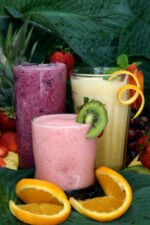
Are you searching for new drink ideas? If so you’re not on your own. As concern, regarding the sugar and energy content of carbonated drinks and fruit juice, gathers momentum many people are looking for alternative drinks to have.
Vegetable juices
These seem to tick all the boxes for modern-day life:
- A quick way for busy people to eat their vegetables
- An easy solution for picky children who won’t eat vegetables willingly
- Changing the vegetable combinations and recipes makes for interesting flavours and creativity
- Concentrating all those raw vegetables by blending exposes us to a higher concentration of vitamins and minerals.. surely this must ensure better nutrition
- Juicing is fun, lots of new gadgets to play with, apps and cook books it adds a new dimension to cooking which is good.. right?
These things hold some truth and for most people a glass of juice each day as part of a healthy diet will do no harm. However there may be some factors about juicing that are worth considering particularly if using juice as a meal replacement.
Gut activity
Dietary fibre is important for good health:
- Chewing vegetables strengthens the teeth and jaw and also stimulates saliva secretion which contains ∞ amylase an enzyme that assists the breakdown of carbohydrate to release energy.
- When you take a low GI vegetable and process it you are effectively increasing its GI rating meaning that glucose will be released into your system and fade more quickly than if that vegetable had been left intact.
- The soluble fibre in vegetables helps to slow down the transit time of food passing through the gut and insoluble fibre adds bulk which helps us to feel full, for longer. This suppression of hunger, assists weight control and potentially also saves food dollars which might otherwise be spent on in-between meal snacks.
- Resistant starch in some vegetables such as peas, potato and corn helps to feed colonic bacteria important for the health of the protective cells lining the bowel.
If you are taking juice regularly, if could be robbing your gastric system of work, exercise and protection.
Is concentrating foods causing gastrointestinal discomfort?
- Juicing can increase the fructose load delivered to the gut per serving. This could lead to gastric discomfort particularly for people with irritable bowel syndrome.
- When taken raw some vegetables such as cabbage, cauliflower, broccoli and kale have a high sulphur content. During cooking these compounds are volatile and so can escape into the atmosphere however, when blended raw, these compounds may remain in the mixture and contribute to flatulence.
- When foods are beaten in a blender air is whipped into the mixture. This trapped air traveling through the gastrointestinal tract and may lead to feelings of bloatedness and discomfort.
Suitability of vegetables
Kale
Kale is a very healthy green vegetable that contains protein so is useful to vegans and vegetarians. It also contains Vitamins A, C and K along with folate and calcium. While Kale can be eaten steamed or boiled do take care if juicing it. Vitamin A is a fat soluble vitamin which is stored in the liver and can be toxic if taken in excessive amounts. Women who are pregnant should exercise care.1
Vitamin K also present in Kale is important for blood clotting. Therefore people taking anticoagulant (blood thinning) medication such as Warfarin should take their kale as a solid vegetable rather than as a concentrated juice which could interact unfavourably with this drug.2
Carrots
Carrots are low in energy but contain a moderate amount of Vitamin C, potassium and dietary fibre.They also contain ∞ carotene and β carotene which are converted to Vitamin A in the body.The bright carotene pigment gives carrots their distinctive orange appearance. If taken in excess regularly this carotene can lead to a person’s skin taking on a slightly orange discolouration. 2
Beetroot
Beetroot juice is capturing the interest of sport scientists. While it contains dietary fibre, potassium folate and other B group vitamins, Beetroot (as well as some green vegetables such as celery, lettuce, rocket and spinach), also contains nitrates. The amount of nitrates in vegetables is determined by such things as freshness and farming practice’s during harvesting. Fresh vegetables grown with nitrogen containing fertiliser will yield higher levels of nitrates, so organically grown vegetables may have lower levels.3
Nitrates can be converted, by oral bacteria and during digestion in the stomach, into nitric oxide which acts as a neurotransmitter (signalling molecule) for a range of different body processes.
For instance nitric oxide can act as a vasodilator, increasing blood flow; it can regulate muscle contraction and glucose uptake and also regulate cellular respiration. These benefits can improve exercise efficiency by theoretically allowing an individual to exercise at a greater intensity for the same level of effort.3
One study by Larsen (2007) using up to 300mg of nitrate (equivalent to eating 250g nitrate-rich vegetables such as rocket, lettuce, spinach, bok choy and broccoli) reduced VO2 during submaximal exercise improving cycling efficiency by approximately 1.4% 4 This may not sound like a large effect but in sport >1% improvement in performance can make the difference between winning and losing a race.
Studies have since looked at the timing intervals to achieve results. Studies by Bailey (2009) using doses of 500ml doses of beetroot juice per day for 6 days observed a reduction in oxygen use by 19% at moderate workloads and approximately 16% improvement in cycling exercise to exhaustion. 5
Since then other studies, using shorter time frames of intervention, by Lansley (2011) have reported improvements of around 3% in cycling performance when beetroot juice was administered just 2.5hours before exercise.6
As with all competition strategies these drinks must be trialled during training sessions to study the effect on an individual’s performance before implementing them for important events.
The use of nitric oxide appears to be most marked in endurance sports with work still needing to be done on its usefulness to team and power sports. Issues such as dosage, tolerances and side effects have yet to be decided. 3
Beetroot juice can cause gastrointestinal discomfort. It can also cause pink discolouration of urine and stools which is harmless and temporary. As there is limited evidence, as to the risks associated with higher levels of nitrate intake, care must be taken when supplementing with doses greater than would be normally consumed through food. For this reason nitrite supplementation should be avoided.3
Milk
Milk continues to be recommended by Dietitians to replace carbonated drinks and juice. There is now a wide range of milks available to those who may dislike the taste or are intolerant to dairy milks. Making a fruit smoothie after school or work and taking a warm milk drink prior to bedtime can greatly improve protein and calcium intake important for growth and body repair and may also improve sleep.
Tea and coffee
Tea and coffee remain popular drinks and research now shows both to be less dehydrating than formerly thought 7
Coffee consumption may protect against colorectal cancer. Green tea may protect against cancer of the stomach, colon and rectum, breast and ovary and black tea against prostate cancer.
Research involving green tea has noted it contains polyphenols and flavanols which have an anti-oxidant effect and regular intake is associated with a reduced risk of stroke and coronary heart disease and lower levels of LDL cholesterol (but no effect on HDL)8
The main benefit of caffeine comes from its effects on the central nervous system as it reduces the perception of effort and fatigue. Previous beliefs that caffeine increased fat use during exercise and spared glycogen are now considered unlikely to be the main pathway of performance enhancement 9
Coconut water
Coconut waters are now being marketed as a natural energy sports drink with a high potassium and mineral content, low in fat, carbohydrate and calories. While these drinks may be a welcome change from drinking water their use as a sports drink is limited because they are lower in energy and sodium than other sports drinks, ingredients essential to athletes with high sweat losses and increased energy needs.
Infused waters
There is nothing cheaper and healthier than water from the tap. All that we need to do is find ways to drink it. If plain cold water with a block or two of ice is not exciting enough in warmer months then here are a few ideas to experiment with:
- Add fresh herbs such as mint, coriander, rosemary
- Add diced cucumber or celery
- Try diced lime or lemon
- Experiment with different fruits such as diced strawberries; pear; orange;peach; nectarine or kiwifruit
- Try combos such as diced apple or pear with lemon zest and an 1/8 tsp ground ginger or cinnamon
- In cold weather try making a hot drink using lemon (2 lemons) or orange (1 orange) with 1 cup boiling water, ½ tsp honey and add a pinch of ginger or cinnamon or mixed spice.
If you would like to discuss any of this information or arrange to have your hydration strategies or nutritional intake assessed then contact Lea today
For more of Leas articles on related topics see:
What are our children drinking?
Juice diets -are they as healthy as they sound?
Boosting fibre intakes offers health benefits
Drink milk for better health
Can caffeine fix performance?
Can coconut improve our health?
References
- Mann, J. Truswell AS. Toxic effects of Vitamin A. Essentials of Human Nutrition 1998 Oxford Press: pg193
- Mann, J. Truswell AS. Vitamin K and Deficiency Disease. Essentials of Human Nutrition 1998 Oxford Press: pg242
- Sports Dietitians Australia Factsheet on Nitrates 2011 sportsdietitians.com.au
- Larsen F.J, Weitzberg, E et al. (2007) Effects of dietary nitrate on oxygen cost during exercise Acta Physiologica 191 (1):59-66
- Bailey, S.J, Winyard, P et al (2009). Dietary nitrate supplementation reduces the O2 cost of low-intensity exercise and enhances tolerance to high-intensity exercise in humans. Journal of Applied Physiology 10 (4): 1144-1155
- Lansely, K.E, Winyard P.G et al. (2011) Acute dietary nitrate supplementation improves cycling time trial performance. Medicine and Science in Sports & Exercise 43(6)
- Goldstein ER1, Ziegenfuss T, Kalman D, Kreider R, Campbell B, Wilborn C, Taylor L, Willoughby D, Stout J, Graves BS, Wildman R, Ivy JL, Spano M,Smith AE, Antonio J. International Society of sports nutrition position stand: caffeine and performance J Int Soc Sports Nutr. 2010 Jan 27;7(1):5. doi: 10.1186/1550-2783-7-5.
- Zheng XX, Xu YL, Li SH, Liu XX, Hui R, Huang XH. Green tea intake lowers fasting serum total and LDL cholesterol in adults: a meta-analysis of 14 randomized controlled trials. Am J Clin Nutr. 2011 Aug [cited 2012 Nov 20];94(2):601-10. Abstract available from: http://www.ncbi.nlm.nih.gov/pubmed/21715508
- Sports Dietitians Australia Factsheet on Caffeine 2011 sportsdietitians.com.au

































































Leave a Reply